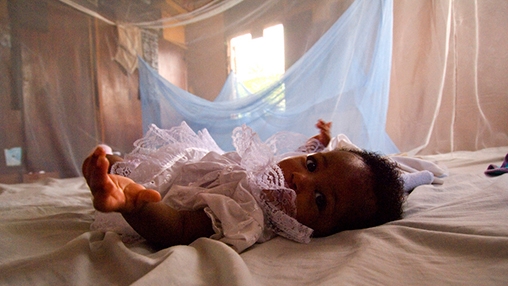Malaria control is an important part of the World Bank’s health portfolio. The Bank’s Health, Nutrition and Population portfolio is valued at $34 billion dollars (as of 2023) and focuses on strengthening health systems, with focus on building strong primary health care systems that have linkages with community health interventions.
Under primary health care initiatives, the World Bank addresses the high-burden of disease and mortality from malaria with prevention methods and treatments for the disease.
Malaria takes a high toll on households and health care systems, and impedes economic development in endemic countries. Malaria also discourages foreign investment, increases people’s out-of-pocket spending on health care, and impairs children’s ability to learn, particularly those who survive severe illness.
The most cost-effective interventions against malaria include the use of long-lasting, insecticidal-treated mosquito nets, effective case management (rapid diagnosis and effective treatment), and indoor residual spraying. Drug resistance can cause serious public health concerns and points to the need to invest also in strengthening essential public health functions such as surveillance in endemic countries.
Partnerships
Dramatic reductions in malaria have occurred through stronger harmonization among partners in support of countries’ programs, global commitment and sustained government leadership.
The international community has united under the Roll Back Malaria (RBM) Partnership. The World Bank is a founding member of the Roll Back Malaria Partnership, which serves as a global framework for implementing a coordinated response against malaria.
The Global Financing Facility is also a significant source of financing for malaria programs through an integrated package of essential services focusing on women and children.
Approach
The World Bank treats financing for malaria control as an integral part of financing for essential health services. The Bank works with countries to ensure that essential health interventions (including malaria) are adequately planned, costed and budgeted for in national health sector plans in a sustainable manner.
The Bank uses a two-pronged approach to support malaria control efforts: First, scaling up effective interventions and second, strengthening systems issues such as supply chain, human resources, and monitoring and evaluation. Strengthening health systems and ensuring that countries perform essential public health functions such as surveillance, will be critical for countries to sustain gains and continue toward elimination of malaria.
Effective malaria interventions focus on prevention of or treatment for the disease.
Prevention may include:
- Insecticide-treated nets
- Seasonal malaria chemoprophylaxis
- Social behavior change communications
- Intermittent preventive treatment in pregnancy with sulfadoxine-pyrimethamine
Treatment may include:
- Artemisinin-based combination therapy
- Rapid diagnostic tests
Nigeria is an example of where targeted interventions are still needed to address the high-burden of disease of malaria. The World Bank is working with Nigeria to strengthen the country’s overall primary health care system, and leverage immunization-focused projects to support malaria vaccine delivery.
The Bank’s malaria strategy has extended to sectors other than health. For example, a $42 million malaria program covering the Senegal River Basin (including Senegal, Mali, Mauritania and Guinea) was embedded in a larger Water Resource Development Project covering the same countries, which took place from 2006-2013. Likewise, in D.R. Congo, the Bank financed $13 million for the purchase of mosquito nets as part of an Emergency Urban and Social Rehabilitation Project which concluded in 2013.

